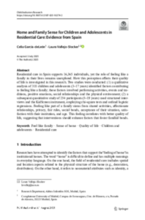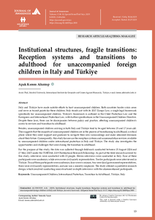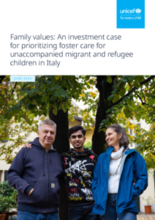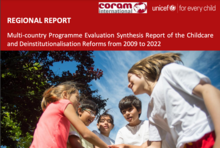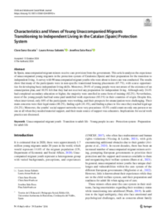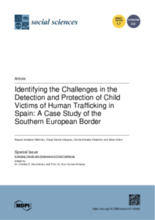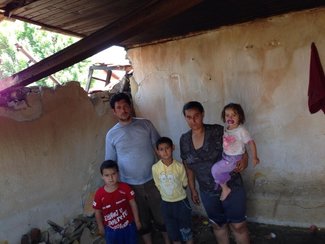

Displaying 11 - 20 of 544
Foster care is the preferred out-of-home placement for children at risk. However, the number of children in child protection systems exceeds the availability of foster families, highlighting the need for recruitment campaigns. Despite the growing development of such campaigns, their results have not been evaluated. This study aimed to design and experimentally evaluate messages to increase awareness, willingness, and intention to foster in Portugal.
This research explores how the perception of “feeling like a family” impacts the quality of life for children and adolescents in residential care in Spain. Findings from both qualitative and quantitative studies show that shared activities, affectionate relationships, and supportive environments foster this sense of family, which in turn is strongly linked to improved well-being.
Italy and Türkiye, both key transit countries for unaccompanied children, have legal frameworks to support them, yet gaps between policy and practice hinder access to services and a smooth transition to adulthood. This study, based on qualitative fieldwork and 23 interviews conducted in both countries, examines reception systems, accommodation services, and the challenges unaccompanied children face during this critical life stage.
This report presents the main findings, conclusions, and recommendations of a formative and summative evaluation of the childcare and deinstitutionalisation reforms in North Macedonia for the period of 2009 2022. The evaluation was commissioned by the United Nations Children’s Fund (UNICEF) Europe and Central Asia Region Office (ECARO), as part of its multi-country evaluation of the impact of national child care reforms across eight1 countries in Europe and Central Asia and was conducted by Coram International.
Migrant and refugee children arriving in Italy often face significant trauma, having fled war, violence, and exploitation, and survived one of the world’s most dangerous migration routes across the central Mediterranean. UNICEF’s Terreferme project has shown that foster care placements cost municipalities significantly less than residential facilities, with the added benefit of strengthening the social service workforce through training and case management.
The first comprehensive “Benchmarking Report on Parenting Support Policies and Programs in the Republic of Serbia” aims to support national and local efforts to improve the availability and quality of systemic, cross-sectoral support for parents and caregivers in Serbia, in order to ensure the optimal development of children and young people.
This study examines how policy developments and the introduction of the Minor Protection (Alternative Care) Act, Chapter 602, have shaped the alternative care system and impacted the welfare and rights of children and families in Malta. It analyzes legislative intent, stakeholder perspectives, and gaps in practice, highlighting challenges and proposing reforms to strengthen the law’s implementation and support ongoing alternative care improvements.
This report presents the main findings, conclusions, and recommendations of an evaluation of the child care and deinstitutionalisation reforms in seven countries in the Europe and Central Asia Region (Bulgaria, Georgia, Moldova, Montenegro, Northern Macedonia, Serbia and Tajikistan). The report offers valuable insights into the effectiveness of child protection systems and the transition from institutional care to family- and community-based alternatives. It highlights key achievements, lessons learned, and best practices, while also addressing the areas where further improvements are needed to ensure that every child can grow up in a nurturing, safe, and supportive environment.
This article analyzes the experience of unaccompanied young migrants in the protection system of Catalonia (Spain) and their preparation for the transition to independent living. A survey with 90 unaccompanied migrant youths who were about to leave care was conducted.
Analyzing 23 interviews with professionals in the field, this article identifies the factors that contribute to high levels of child trafficking in Spain.

